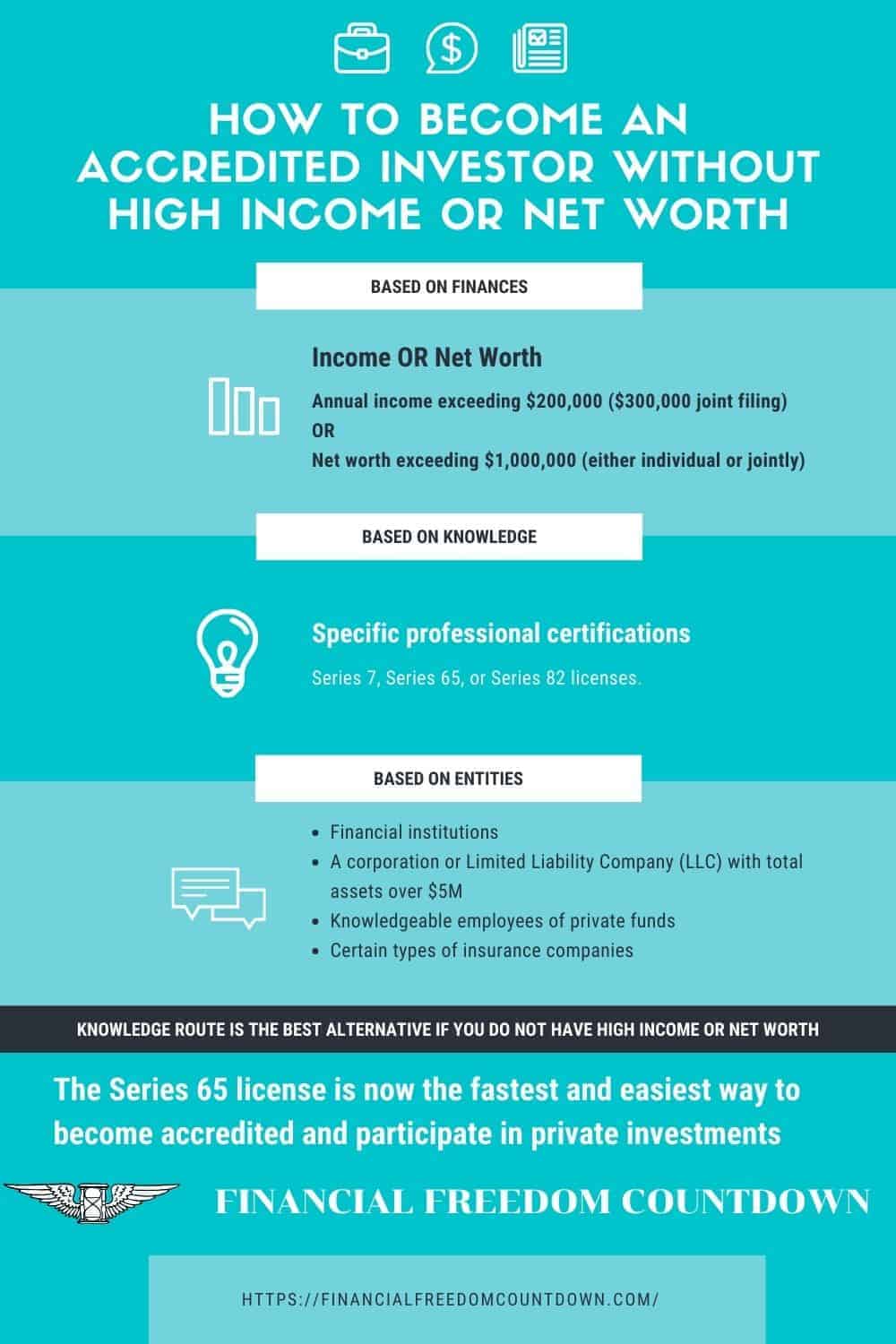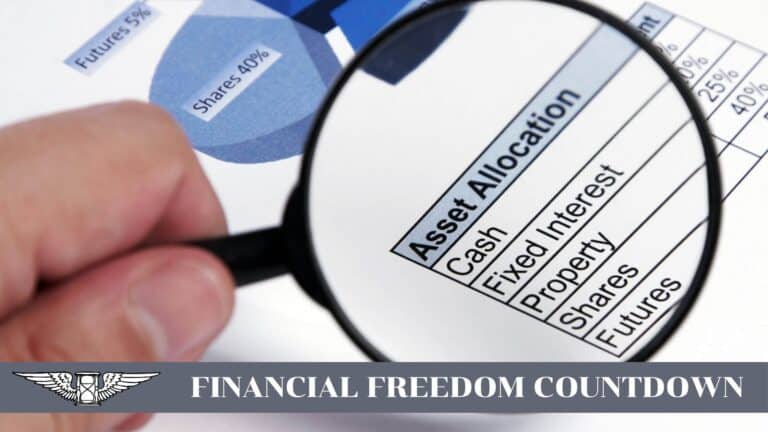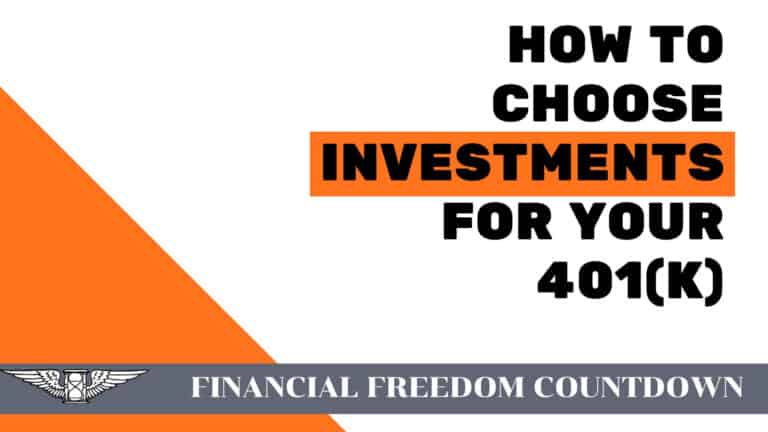Accredited Investor Qualifications: How To Become An Accredited Investor Without High Income Or Net Worth

Stock markets hitting record highs every day have many investors, including myself figuring out our portfolio’s diversification. Analyzing the list of best assets to buy, we notice that asset-based lending provides the best return on a risk-adjusted basis. Since asset-based lending involves lending money secured by assets, some protection level assumes the investment is accurately valued.
The rise of professionally managed platforms provides opportunities for investing in passive asset-based lending such as real estate syndication, farmland, art, lawsuit financing, etc. Unfortunately, many of these investments are restricted to only accredited investors. An accredited investor status opens the doors to additional investment opportunities.
Today, let us explore the accredited investor definition. What are the accredited investor qualifications? In the past, accredited investor status was restricted to high-income earners.
As someone who did not have a lot of net worth or income at the start; but slowly improved my human capital, the accredited investor qualifications always felt unfair. Based on the revised Securities and Exchange Commission (SEC) guidance, you can qualify to be an accredited investor without the high income or net worth requirements.
Why Accredited Investor Restrictions Exist
The SEC regulations restricting investments to only specific investors’ categories resulted from past frauds. Since many unscrupulous promoters take advantage of investors promising high returns, the SEC put restrictions on investment in such opportunities.
The original accredited investor qualifications was based on high income and net worth. The rationale was that such investors could afford to lose money in investments compared to grandma living on social security.
Of course in any investment, individuals needs to do due diligence else one could end up losing money. Even accredited investors like me lost money after which I developed a 10 point checklist to evaluate real estate crowdfunded deals. I do understand the SEC’s reasons but an alternative could be to restrict the amount invested based on a percentage of net worth instead of totally preventing a majority of the population from investing in these asset classes.
The road to hell is often paved with good intentions. Many investors were left out in the cold, and the constraints restricted asset-backed investments to wealthy individuals making the rich even richer.
It is indeed ironic that individuals can open up margin accounts on Robinhood without understanding how options are traded. But loaning money at 10% backed by real estate on a real estate crowdfunding platform is often restricted only to high-income individuals.
One of the big reasons why I am in favor of individuals learning about investing in real estate with little or no money if passive income from real estate investments are not accessible
After a lot of public comment, the SEC has now modernized the criteria for accredited investor qualifications.
“For the first time, individuals will be permitted to participate in our private capital markets not only based on their income or net worth, but also based on established, clear measures of financial sophistication.”
Jay Clayton, SEC Chairman
What Are the Qualifications To Be An Accredited Investor
The SEC has three main criteria to validate the accredited investor qualifications
- Financial
- Knowledge
- Entities
Investors can qualify based on meeting any one of the three criteria.
Accredited Investor Qualifications Based On Finances
You can meet the Financial qualifications for accredited investor definition based on either the income level or net worth.
Income Criteria
Accredited investor qualification is based on an annual income exceeding $200,000 ($300,000 joint filing) for the last two years with the expectation of earning the same or more income in the current year.
Net Worth Criteria
Accredited investor qualification is based on a net worth exceeding $1,000,000 (either individual or jointly) for the last two years. If you don’t know your net worth, sign up for free with Personal Capital. I use Personal Capital to track my net worth, budget, and also retirement planning.
Accredited Investor Qualifications Based On Knowledge
The SEC improved the accredited investor definition and added the knowledge criteria.
Any individual can meet the accredited investor qualifications by having specific professional certifications, designations, or other credentials issued by an accredited educational institution.
The approved designations include individuals in good standing with the Series 7, Series 65, or Series 82 licenses. The SEC could also reevaluate and add additional certifications, titles, or credentials in the future.
Also, as part of the rule change is the SEC adding the term “spousal equivalent.” This means that if one spouse qualifies as an accredited investor, the person’s spouse does as well.
Accredited Investor Qualifications Based On Entities
The following can also qualify as accredited investors:
- Financial institutions
- A corporation or Limited Liability Company (LLC), not formed for the specific purpose of acquiring the securities offered, with total assets over $5M
- Knowledgeable employees of private funds
- Certain types of insurance companies
The entity-based criteria for accredited investor definition do not seem relevant to us except for the “knowledgeable employees of private funds.” However, it would be safe to assume that if a private fund already employs you, you might have better options at work as the employees of Renaissance and the money printing Medallion Fund.
How To Become An Accredited Investor Without High Income Or Net Worth
If you do not satisfy the traditional income or net worth accredited investor qualifications, the knowledge route is the best alternative.
The series 65 is an exam administered by the Financial Industry Regulatory Authority (FINRA) and provides individuals’ license to act as investment advisers in the U.S.
| Fees | $175 |
| Hours of study needed | Approximately 60 hours |
| Firm sponsor needed | No. Individuals can directly apply |
| Type of test | Answer 130 questions in 3-hour test |
After you pass the test and receive your license, you also need to be in “good standing” to meet the accredited investor definition as per the SEC.
On August 26, 2020, the U.S. Securities and Exchange Commission (“Commission”) adopted amendments to the definition of “accredited investor” which allows persons who hold a Series 65 license in good standing” to qualify as accredited investors. The SEC explained in its Small Entity Compliance Guide for Amendments to the Accredited Investor Definition that “Whether a person holds one of the designations in good standing is specific to that designation, and persons seeking accredited investor status under this category should consult FINRA rules and any state rules applicable to them. For example, a person seeking accredited investor status by passing the Series 65 exam would also need to be licensed as an investment adviser representative in her state and would need to comply with all state-specific licensing requirements (e.g., paying dues, etc.).”.
Please check with your state securities regulator for specific requirements.
You can now purchase securities not registered with the SEC legally. And a whole world of investment options from asset-backed lending to venture capital funds to angel investments is now available.
Series 7 is considered an entry-level exam. However, it requires your firm to sponsor you for the exam. As a result, series 65 is the easier option to meet the accredited investor qualification.

Documents To Determine Accredited Investor Eligibility
You cannot register as an accredited investor in one location. Every platform you want to invest in would need to verify your documents. Luckily, the list of documents to determine accredited investor status is minor.
If you rely on financial eligibility for accredited investor qualifications, you need to submit only your W2s and Tax returns.
If you rely on knowledge for accredited investor qualifications, you need to submit proof of your professional certifications.
Some investment platforms request the documents every year to recertify. Other investment platforms have only asked for documents in the first year and then let me continue to signup for new investments even after several years. Another reason I highly recommend signing up for these various platforms even if you do not plan to invest right away. If something changes, you might not be able to access these investments.
Benefits Of Accredited Investor Designation
After you meet the accredited investor qualification, you can now invest in a wide range of asset-backed investments. Some of my favorite alternative investment platforms are
Crowdfunding platforms for accredited investors
EquityMultiple is a real estate investing platform that gives accredited investors direct access to individual commercial property, allowing you to review, compare, and personally choose the deals that meet your investment criteria. EquityMultiple has a low minimum of only $5,000 investment. They are one of the few sites that claim to co-invest in every investment, ensuring “skin in the game” and the most significant incentive to do maximum due diligence. EquityMultiple has many different asset types: office buildings, industrial, senior housing, retail, residential, self-storage, student housing, data centers, etc.
CrowdStreet is a commercial real estate investing platform for accredited investors. It has a higher minimum of $25,000 per deal. CrowdStreet offers both single property investments and multi-property funds, as well as both equity and debt deals. Most commercial real estate investments have no investor fees (unless investing in a fund with underlying fees). CrowdStreet has the highest number of different asset types available for investing. Commercial real estate projects, including office buildings, industrial, hospitality, senior housing, retail, multifamily apartments, storage, schools, medical centers, student housing, data center, parking garages, etc., are available to invest directly.
Art is now fractionalized and you can share in the investment growth of artists such as Banksy or Picasso by investing in the paintings via Yieldstreet.
Crowdfunding platforms for non accredited investors
A few options are available using the REIT structure if you wonder about equity crowdfunding for non-accredited investors. Note that these REITs are not the same as publicly-traded REITs. Unlike many publicly-traded REITs, the crowdfunded investments are typically privately held. We discussed publicly-traded real estate investment trusts and how they differ from private REITs.
Streitwise is offering a fund structure and is available for accredited and non-accredited investors. They have one of the lowest fees and high “skin in the game,” with over $5M of capital invested by founders in the deals. I do like the high conviction to invest their own money along with other investors. You can invest in Streitwise as an Individual, LLC/Corporation, Trusts or IRA/401(k). The other advantage is that Stretwise is also open to foreign/non-USA investor. Minimum investment is $5,000.
The trade-off for non-accredited investors with Streitwise is that you cannot select one particular property; but rather an eREIT invested in several commercial real estate investments. If you are a fan of diversification, the investment spread over multiple properties reduces the risk.
| Investment Platform | Open to | Type of Investment | Minimum |
|---|---|---|---|
| EquityMultiple | Accredited Investors | Commercial | $5,000 |
| CrowdStreet | Accredited Investors | Commercial | $25,000 |
| Yieldstreet | Accredited Investors | Art, Legal, Structured notes, Venture Capital, etc. | $10,000 |
| Streitwise | Accredited and non-Accredited Investors. And also foreign/non-USA investors | Commercial | $5,000 |
If you do not qualify as an accredited investor based on financials, you can still meet the accredited investor qualifications based on knowledge.
Final Thoughts On Accredited Investor Qualification
I am glad the SEC has modernized the accredited investor definition to provide additional options for individuals without high income or net worth to qualify.
The knowledge-based test ensures that individuals understand the investments. It also provides an additional career option if you want to start a side hustle as an investment advisor.
Readers, have you tried to signup for accredited investment opportunities in the past? Do the new additional criteria make it easier to invest?

John Dealbreuin came from a third world country to the US with only $1,000 not knowing anyone; guided by an immigrant dream. In 12 years, he achieved his retirement number.
He started Financial Freedom Countdown to help everyone think differently about their financial challenges and live their best lives. John resides in the San Francisco Bay Area enjoying nature trails and weight training.
Here are his recommended tools
Personal Capital: This is a free tool John uses to track his net worth on a regular basis and as a retirement planner. It also alerts him wrt hidden fees and has a budget tracker included.
Platforms like Yieldstreet provide investment options in art, legal, real estate, structured notes, venture capital, etc. They also have fixed-income portfolios spread across multiple asset classes with a single investment with low minimums of $10,000.








This makes it sound like all you have to do is pass the test and boom–you’re licensed.
But this isn’t true. You have to become a licensed advisor in your state, and states have a lot of requirements beyond just passing the test.
It would be better to have someone consult on this article who has actually been down the path, because you’ve oversimplified it to the point of being misleading.
Can you clarify if your comment is related to passing the Series 65 to be licensed as an RIA? That is not the purpose of this article.
This article is to satisfy the SEC accredited investor criteria by having the series 65 certification and being knowledgeable enough to invest.
Of course, if individuals want to become an RIA, they have additional steps to complete and go on that route.
Edit: Never mind. I see what you mean and added the additional paragraph on “good standing”. Thank you for pointing it out